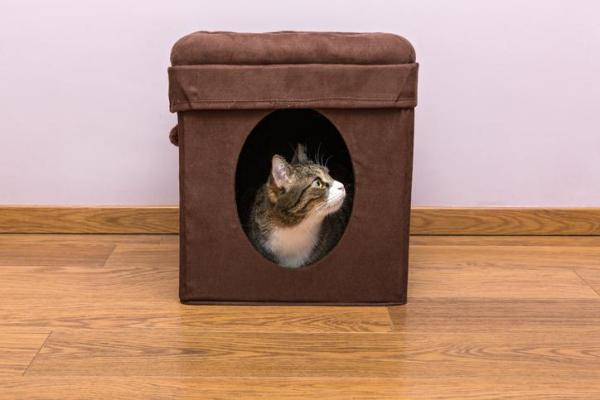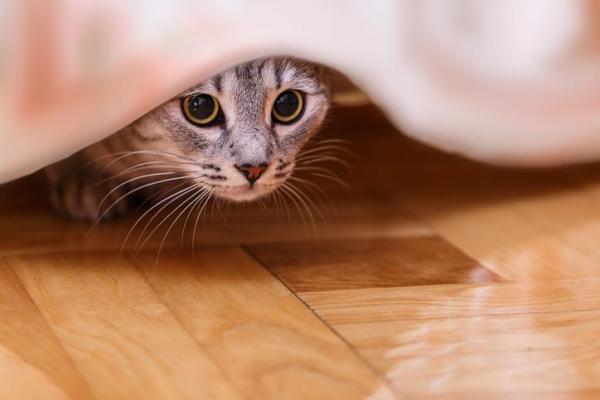Why do Cats Hide in Dark Places?



See files for Cats
Some cats are natural hermits. They somehow manage to find spaces in the house you have never even seen before, hiding away for naps or just some personal time. It's even common to spend all day calling their name just to find out they've discovered a cosy spot near the airing cupboard. However, some cats don't normally behave in this way and you might wonder if their desire to go AWOL has some less healthy impetus. The worry is that if they are starting to hide all of a sudden, perhaps it is due to stress or some underlying pathology.
AnimalWised looks into why do cats hide in dark places so that we can rule out any possible issues and see what treatment is required if necessary. Hopefully it's nothing more than a need for a little peace and quiet.
Why do cats hide?
The habit of hiding is a common characteristic of feline behavior. A healthy cat may run and hide when it wants to play with their owner or even to take a toy to play with in private. Sometimes, they may simply want to find a quiet and cool place to hide from the sun's rays on a hot day. Hiding is also linked to their innate hunting instincts. If a cat spies an insect or bird and wants to stalk it, they will often find a place with low light so that they can best have the element of surprise. This is partly because a cat's keen eyes are often better in the dark than in bright light.
However, while some aspects of hiding in dark places are normal for cats, we also need to pay close attention to behavioral changes. If a cat didn't normally hide before, or if they did so rarely, then begin to spend more time under shelter, it could indicate some sort of physical or mental imbalance. It's also important that you look at other signs and symptoms such as their body language to register any indications there is a health concern with your kitty.
Here are the main negative causes of why your cat may be hiding in the dark all of a sudden:
- Negative/unstimulating environment: a cat often hides due to simple boredom. This usually occurs when the cat does not have enough stimulation in their environment to keep them sufficiently entertained. Particular concern is with kittens which are left alone for too long and don't have a enough environmental enrichment to keep them physically and mentally stimulated.
- Stress: like humans, cats which are exposed to high levels of stress can feel the need to hide in a quiet environment as well as exhibiting other behavioral changes. It's crucial you are aware of the potential symptoms of stress in your cat and quickly consult your veterinarian once they have been identified.
- Poor socialization: also akin to humans, cats need to relate to other beings for their own well-being. This is especially if kitten are not socialized properly, leading them to have some behavioral disorders later in life. You cat may even be comfortable enough when you are around, but hide in dark places when you have visitors or surprise guests. This is likely due to a lack of socialization making them think this visitor is threatening their territory.
- Critical period of socialization: poor socialization is usually due to inadequate training when they are a kitten, but sometimes this can't be helped. You should never take a kitten away from their mother and siblings before the right time. This is because between the first 4 and 12 weeks of a cat's life is a critical period for socialization where they need to understand how to properly interact with others. However, this can sometimes happen for a variety of reasons such as discovering an abandoned litter.
- Adapting to a new home: for you, moving to a new home might be stressful due to packing possessions and paying deposits. For cats, they are moving from a territory they have dominated and in which they have become comfortable to a whole new place which is alien to them. If you cat hides in dark spaces after moving to a new home, then you will need to exercise patience. Don't force them to come out. Instead, reward exploratory behavior and try to ensure they are comfortable in their new environs as best you can.
- Fear: it may not be the fear of the unknown, as in moving to a new home. Cats exhibit fear as it allows them to be extra alert and escape possible threats as they would in the wild. If they hear loud noises or see objects which appear threatening to them then they may hide out of fear. Common household noises which can scare cats include vacuum cleaners, blenders and hair dryers. Their feline senses are heightened and any stimuli they see as threatening can cause them to run to safety.
- Trauma: many cat owners are making the wise decision to adopt a cat from a shelter as a surplus of cats means there are not enough homes to keep them all housed. Some of these cats are unfortunate enough to go through some sort of trauma, whether taken away from their family too early or even being physically abused. This is common in kittens, but adult cats may go through trauma before going into a new home. Even otherwise well reared family cats can have a traumatic experience such as being hit by a car or attacked by a dog, often without us realizing it. If this is the case, then hiding is common. Getting advice from a feline ethologist might be the best way to help your cat cope with their trauma.
- Overcrowded homes: adopting a companion cat can be a great way to help your cat get the right kind of stimulation and socialization it requires. However, if a cat is not introduced correctly or a cat was never properly socialized, bringing in a new cat cat be cause for concern with your cat. As cats are very territorial, these two new housemates may butt heads over who is dominant. Your cat may hide in fear of a new cat introduced to the home or they might simply be worried about how to deal with it.
- Death: when cats are near death, they will understandably feel vulnerable. This is why many will try to find a safe environment in which to spend their last moments. If your cat is very old or you know them to be ill already, then they may possibly be finding a dark place to hide so that they can pass on in peace.

The importance of ruling out pathological causes
Some pathologies cause acute pain, affect the senses or causes an imbalance in a cat's metabolism. They can also lead to behavioral changes and promote the development of phobias and trauma. If your cat starts hiding in dark places all of a sudden, then it is important to rule out the possibility of something medically troubling. Bringing the cat to a veterinarian or animal specialist will mean the proper tests and diagnostics can be carried out to determine this cause and suggest appropriate treatment.
It's also important to note that some cats will hide in unusual places if they detect the presence of fleas, mites or other pathogens. These small parasites can often stay in carpets, linens and behind other materials such as doormats. They may not be evident to you as you are so far away from them, but your cat's keen sense of detection may make them more aware. This is why it is very important to respect your cat's vaccination schedule and ensure they are given the right course of deworming treatment. This will not only increase the hygiene of your home, but also make your cat happier and less likely to hide in dark places.
What can I do to help my cat?
If you are unsure of the cause of your cat's over-reliance on hiding, it is important to seek a vet's advice. If your cat is hiding for natural reasons or simply because they have found a favorite new sport to chill, then no treatment may be necessary. Also, if your cat is calm and contented in a hiding spot, it's important not to move them unless completely necessary. It's important to respect our cat's idiosyncratic personality as well as provide their essential freedoms for welfare.
If you do need your cat to come out of hiding, it is very important you shouldn't yell at, scare or grab them. This exposes the cat to high risks of unnecessary stress and can encourage self-defensive behaviors which can make them difficult to live with. Acting serenely and trying to coax them out with toys or treats is a much healthier approach.
in the advent of a pathology or disease being diagnosed, the vet will advise you on the most appropriate course of treatment for your cat. Whether it is a psychological or emotional disorder, it's important to consult a specialist whether it is a feline psychologist or cat ethologist. These professionals will be able to base this treatment on special guidelines which should benefit their self-confidence and bring balance to their life. If their hiding in dark places does come from an unhealthy place, then this can help change this behavior.
These following simple guidelines will also help prevent your cat from developing certain behavioral problems like hiding in dark places:
- Provide adequate preventative medicine: the first thing you need to do when a new cat comes into the family is to make sure it has adequate preventative medicine. If your cat is adopted from an animal shelter, they should have taken care of their initial treatment before allowed to come home with you. You will also need to follow their vaccination and deworming schedule. Take your cat to the vet around very 6 months or so for a check up, even if they seem otherwise healthy.
- Positive and enriched environment: it's important to know the value of environmental enrichment for cats. Keeping them physically and mentally stimulated, even when you are not at home, will help avoid the symptoms of stress and boredom which can be detrimental to their well-being. Also make sure they have the right litter box, access to space for exercise and have some toys and scratching posts to help stay occupied.
- Socialization: some house cats will not be able to go outside and, therefore, will not have the same type of socialization as some. However, all cats will need company in some form or another. Whether adopting a kitten or keeping an adult cat stimulated, it is important to ensure they have enough interaction to feel loved and stay happy.

If you want to read similar articles to Why do Cats Hide in Dark Places?, we recommend you visit our Behavioral problems category.







